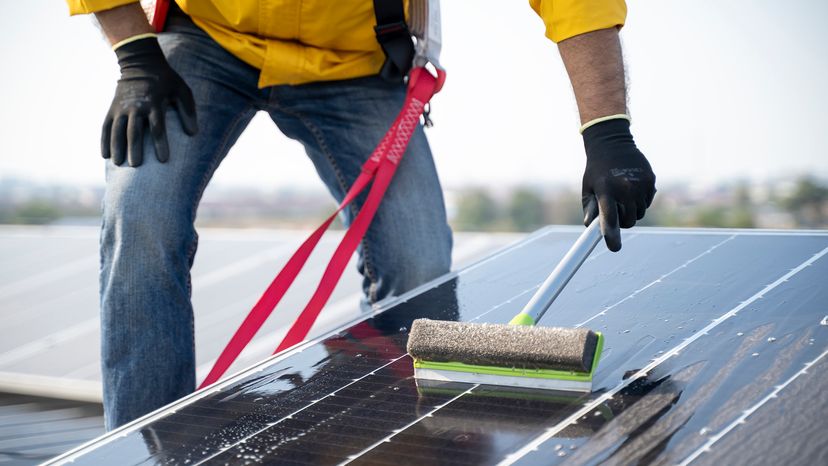Aim to clean your solar panels when it's cooler to avoid the glass cracking. Also, be mindful of the cleaning agents you use; you want to stay away from anything abrasive.
Step 1: Check Manufacturer Guidelines
Before you start the cleaning process, review the manufacturer's instructions for your solar panel system. Some panels have specific recommendations for cleaning that can help prevent damage. If your panels are under warranty, be sure that DIY solar panel cleaning won't void the coverage.
Step 2: Gather Your Cleaning Supplies
Use a solar panel cleaner or a mild soap mixed with water to clean your solar panels. Avoid using a pressure washer, as the force can damage the panels. Gather:
- Mild soap, solar panel cleaner or vinegar
- A squeegee or microfiber towel
- A bucket of clean water
- Garden hose
- A ladder
- Ladder support
- A harness
Step 3: Turn Off the Solar System
For safety reasons, shut down your solar system before beginning the cleaning process. This step prevents electrical hazards while working on dirty solar panels. If you're unsure how to do this, consult the manual or contact a professional for guidance.
Step 4: Rinse with Water
Use a hose with low water pressure to rinse off loose dirt and debris. This helps prevent scratching when you start scrubbing. Avoid using hot water, as the sudden temperature change can crack the glass on the panels.
Step 5: Gently Scrub With a Soft Brush
Dip the soft brush into the cleaning solution and gently scrub the panels to remove stubborn grime. Focus on areas with visible dirt and avoid applying too much pressure. Use nonabrasive tools to prevent scratching.
Step 6: Rinse and Dry
After scrubbing, rinse the panels with clean water to remove any remaining soap or debris. Use a squeegee or a microfiber cloth to dry the surface and prevent water spots. Keeping your panels streak-free enhances their ability to absorb sunlight.
Remember to Inspect for Damage
While cleaning, take a moment to inspect your panels for any signs of cracks, loose wiring, or damage. If you notice anything unusual, consider hiring professional solar panel cleaning or maintenance services to address the issue.
